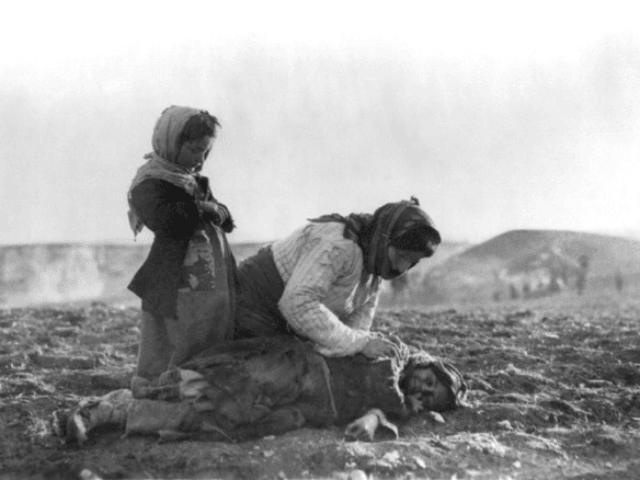Armenians around the world commemorated the 105th anniversary of the Armenian Genocide on Friday, a remembrance of the more than 1.5 million Armenians who were systematically exterminated between 1915 and 1923 under the Ottoman Empire.
The events, which also happen to be the world’s first modern Christian genocide, remain a contentious issue in world affairs because of Turkey’s refusal to acknowledge them as a “genocide,” with countries that do so tending to lose favor with Ankara. As of April this year, 28 countries around the world recognize the events as genocide, including Brazil, Germany, and France.
In a statement on Friday, Armenian President Armen Sarkissian called on countries with ties to Turkey to step up and recognize the events as genocide:
The issue of recognition of the Genocide, which the Armenians raise before the international community and Turkey, has a number of components: duty of remembrance, prevention of the repetition and condemnation of such crimes, elimination of the consequences of the Genocide.
We cannot on one hand declare that we are going to fight together against xenophobia, discrimination, intolerance, anti-Semitism, denial and other all-human vices, and on the other hand “play diplomacy” with Turkey on the Armenian Genocide. Many of the states, which have huge interests in Turkey, have overcome that barrier, and we are grateful to them.
“Statute of limitation does not apply to the crime of genocide,” he concluded. “Recognition of the Armenian Genocide by Turkey and elimination of its consequences is a matter of security for Armenia, the Armenian nation, and the region. We will not forget the Armenian Genocide; we will not submit to its consequences.”
Today all Armenians commemorate the 105th anniversary of the #ArmenianGenocide, a crime not only against our ethnic identity, but also against mankind. On April 24, united we stand to remember our past, to celebrate 1.5 million lives and to prevent inhumane acts in the future. pic.twitter.com/OTo4xSergF
— Nikol Pashinyan (@NikolPashinyan) April 24, 2020
Commemorative events typically take place on April 24 in Armenia and among diaspora communities, although this year they were canceled as a result of the Chinese coronavirus pandemic that has led to lockdown measures being imposed in a majority of countries around the world.
One of the countries that still does not officially recognize the genocide, presumably out of fear of damaging relations Turkey, is the United States. In a statement put out on Friday to mark the anniversary, President Donald Trump acknowledged the horrific nature of the events, but stopped short of calling it a “genocide.”
The statement read:
Today, we join the global community in memorializing the lives lost during the Meds Yeghern, one of the worst mass atrocities of the 20th century. Beginning in 1915, 1 and a half million Armenians were deported, massacred, or marched to their deaths in the final years of the Ottoman Empire. On this day of remembrance, we pay respect to those who suffered and lost their lives, while also renewing our commitment to fostering a more humane and peaceful world.
It remains a fact widely recognized by scholars, historians, and other experts that what took place between 1915 to 1923 were not indiscriminate massacres, but planned acts of genocide against the Armenian people based on ethnic and religious prejudices. To this day, Turkey controls vast swaths of former Armenian territory and many of its Armenian inhabitants have been forced to convert to Islam. Christians are systematically persecuted, especially those living in Kurdish territories.
The #ArmenianGenocide, sometimes called the first genocide of the 20th century, took place between spring 1915 and autumn 1916. At least 664,000 people and possibly as many as 1.2 million died during the genocide. https://t.co/L6aErgBQeX
— US Holocaust Museum (@HolocaustMuseum) April 24, 2020
Last December, the U.S. House of Representatives passed a motion branding the events as genocide, although the Trump administration quickly dismissed such recognition.
Turkey is a NATO member and nominally an ally of Washington’s, though President Recep Tayyip Erdogan has engaged in increasingly hostile acts such as purchasing Russian weaponry defying NATO responsibilities.
“The position of the Administration has not changed,” State Department spokeswoman Morgan Ortagus said at the time. “Our views are reflected in the president’s definitive statement on this issue from last April.”
Trump's statement commemorating the Armenian genocide does not include the word "genocide." pic.twitter.com/JvmcnKYMHm
— Alexander Nazaryan (@alexnazaryan) April 24, 2020
Despite the administration’s refusal to acknowledge the events as genocide, the Turkish Foreign Ministry still took issue with Friday’s statement. In its rebuttal, the ministry took issue with Trump’s remarks as based on the “subjective” narrative of Armenians trying to turn the issue into a “dogma” and catering to “domestic political motives.”
Follow Ben Kew on Facebook, Twitter at @ben_kew, or email him at bkew@breitbart.com.

COMMENTS
Please let us know if you're having issues with commenting.